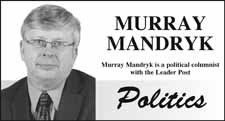Now that we're past the fight over the 14 new federal electoral boundaries, let us examine a few Saskatchewan political realities.
The first political reality is the likelihood we will elect a majority of Conservative MPs, anyway.
For their partisan interests, Conservative MPs tried to convince you of the inherent unfairness of city MPs representing city folk and rural MPs representing rural folk. The reality, however, is that it likely won't hurt the Conservative chances all that much.
Yes, rural ridings will get bigger because we will no longer see four seats in each Regina and Saskatoon containing large swaths of rural Saskatchewan. And, yes, there are always questionable decisions, like a putting Moose Jaw and Lanigan or Lloydminster and Rosthern in the same seat.
But if anyone thinks for a moment that these were ever what sincerely motivated Conservatives' complaints about the new boundaries, think again.
For those Conservatives who questioned the ethics of the two boundaries commissioners unwilling to bend to their wishes of split urban-rural ridings, this was always about getting as many Conservatives elected as possible. And the best way for Conservatives to achieve the maximum MPs from this province is to dilute the NDP/Liberal vote concentrated in the cities with rural votes.
The political reality in a largely rural province like Saskatchewan is that the more rural you are, the more likely it is that you will vote Conservative.
It is for this reason that in each federal generally election of the past 50-plus years, at least half the MPs Saskatchewan has sent to Ottawa were "conservatives". (Although, whether they were Progressive Conservatives, Reformers, Canadian Alliance or the Stephen Harper brand of Conservatives has sometimes varied.)
You read that correctly, folks. Since the 1950s, only in the 1968, 1988 and 1993 elections did Saskatchewan send a majority of "non-conservatives" to Ottawa. This might have been a CCF-NDP province for 46 of the past 69 years, provincially. But only once has the majority of MPs been NDP (1988) and only on two additional occasions in the past 50 years has the majority of Saskatchewan MPs been a combination of NDP and Liberal.
This likely won't change under these new boundaries still dominated by rural seats.
Under the new Saskatchewan federal boundaries, there will be seven rural seats _ Moose Jaw-Lake Centre-Lanigan, Cypress Hills-Grasslands, Humboldt-Warman-Martensville-Rosetown, Lloydminster-Battlefords-Rosthern, Prince Albert, Souris-Moose Mountain and Yorkton-Melville - considered as rural. An eighth seat, Desnethé-Missinippi-Churchill River is really a northern seat. Speaker Andrew Scheer's Regina-Qu'Appelle will be the only truly split urban-rural seat. And five other seats will be seen as urban seats, (although Saskatoon-Grasslands also has a large rural and acreage component).
Also to the advantage of Conservatives is the fact that 10 of their current 13 incumbent MPs are likely to run (or at least, only Maurice Vellacott, Ray Boughen and Ed Kormanicki have indicated plans to retire). That will give the Conservatives name recognition in both urban and rural seats. (Tom Lukiwski will run in Moose Jaw-Lake Centre-Lanigan. Kelly Block says she will seek the nomination in Humboldt-Warman-Martensville-Rosetown.)
Add to the equation the likelihood of the NDP and Liberals splitting the left-of-centre vote and that neither Thomas Mulcair nor Justin Trudeau have all that much appeal in Saskatchewan and one suspects we will still see 10 to 12 Conservative MPs from Saskatchewan.
However, there is one final Saskatchewan political reality worthy of consideration.
Until the first Harper minority government election in 2006, there were only three previous occasions when Saskatchewan sent the majority of its MPs to government side of the House of Commons. This is largely because of number of the Liberal governments elected.
So if Conservatives aren't re-elected as government, Saskatchewan may return to its old political reality of having more opposition than government representation.
Murray Mandryk has been covering provincial politics for over 22 years.




